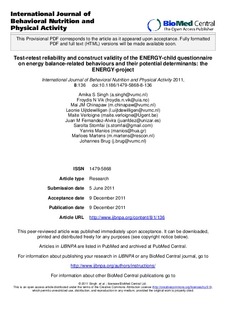Test-retest reliability and construct validity of the ENERGY-child questionnaire on energy balance-related behaviours and their potential determinants: the ENERGY-project
Singh, Amika; Vik, Frøydis N.; Chinapaw, Mai; Uijtdewilligen, Leonie; Verloigne, Maite; Fernandez-Alvira, Juan; Stomfai, Sarolta; Manios, Yannis; Martens, Marloes; Brug, Johannes
Journal article, Peer reviewed
Permanent lenke
http://hdl.handle.net/11250/139007Utgivelsesdato
2011Metadata
Vis full innførselSamlinger
Originalversjon
Singh, A., Vik, F., Chinapaw, M., Uijtdewilligen, L., Verloigne, M., Fernandez-Alvira, J., . . . Brug, J. (2011). Test-retest reliability and construct validity of the ENERGY-child questionnaire on energy balance-related behaviours and their potential determinants: the ENERGY-project. International Journal of Behavioral Nutrition and Physical Activity, 8(1), 136. doi: 10.1186/1479-5868-8-136Sammendrag
BACKGROUND:Insight in children's energy balance-related behaviours (EBRBs) and their determinants is important to inform obesity prevention research. Therefore, reliable and valid tools to measure these variables in large-scale population research are needed.OBJECTIVE:To examine the test-retest reliability and construct validity of the child questionnaire used in the ENERGY-project, measuring EBRBs and their potential determinants among 10-12 year old children.METHODS:We collected data among 10-12 year old children (n = 730 in the test-retest reliability study; n = 96 in the construct validity study) in six European countries, i.e. Belgium, Greece, Hungary, the Netherlands, Norway, and Spain. Test-retest reliability was assessed using the intra-class correlation coefficient (ICC) and percentage agreement comparing scores from two measurements, administered one week apart. To assess construct validity, the agreement between questionnaire responses and a subsequent face-to-face interview was assessed using ICC and percentage agreement.RESULTS:Of the 150 questionnaire items, 115 (77%) showed good to excellent test-retest reliability as indicated by ICCs > .60 or percentage agreement [greater than or equal to] 75%. Test-retest reliability was moderate for 34 items (23%) and poor for one item. Construct validity appeared to be good to excellent for 70 (47%) of the 150 items, as indicated by ICCs > .60 or percentage agreement [greater than or equal to] 75%. From the other 80 items, construct validity was moderate for 40 (27%) and poor for 40 items (27%).CONCLUSIONS:Our results demonstrate that the ENERGY-child questionnaire, assessing EBRBs of the child as well as personal, family, and school-environmental determinants related to these EBRBs, has good test-retest reliability and moderate to good construct validity for the large majority of items.
Beskrivelse
Published version of an article in the journal: International Journal of Behavioral Nutrition and Physical Activity. Also available from the publihser:http://dx.doi.org/10.1186/1479-5868-8-136
